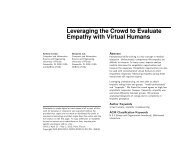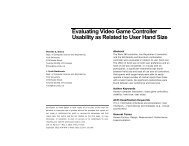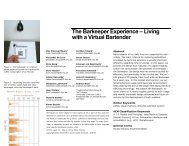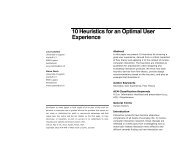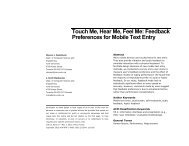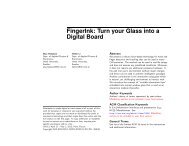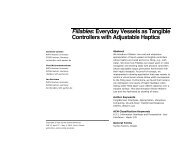Neurodiversity & HCI - alt.chi 2013
Neurodiversity & HCI - alt.chi 2013
Neurodiversity & HCI - alt.chi 2013
You also want an ePaper? Increase the reach of your titles
YUMPU automatically turns print PDFs into web optimized ePapers that Google loves.
can be construed as negative, or if they have come<br />
about serendipitously from other research. One of the<br />
problems is that the medical community has the<br />
motivation and resources to explore these conditions<br />
but tends to ‘medicalize’ conditions [9][10] by focusing<br />
on the negative aspects. While this research has been<br />
highly useful in identifying differences in brain structure<br />
rather than ‘laziness’ or ‘poor parenting’ as causes, it<br />
does lead to the temptation to begin to cure these<br />
‘afflictions’.<br />
It is natural then that computing & <strong>HCI</strong> have already<br />
followed previous modes of research by viewing these<br />
conditions under the larger banner of ‘disability’. A<br />
meta-review was carried out for this paper by studying<br />
papers from both the ACM library including CHI and<br />
SIGACCESS proceedings for the years 1999- 2012<br />
show that of 55 references to conditions of dyslexia or<br />
autism, no paper made any positive mention of any<br />
aspect of either of these conditions.<br />
For many of the neurodiverse community it is these<br />
positive aspects which can be highly useful and<br />
principle components of their value and so identity. As<br />
Cooper says “I am not someone with dyslexia. I am<br />
dyslexic. Were I not dyslexic, I would not be me”[9]. It<br />
is the co-identification with the condition that produces<br />
what a neurotypical might think of as possibly perverse<br />
behaviors. For example medication exists to reduce the<br />
effects of ADHD. Yet this medication typically also<br />
reduces the positive aspects such as creativity as well.<br />
If a neurodiverse person in a creative job and<br />
considerably more creative than their neurotypical<br />
coworkers, it would be natural to expect them to be<br />
less than enthusiastic about taking a drug which might<br />
eliminate their unique advantage regardless of the<br />
negative aspects.<br />
2. Social Model of Disability<br />
So far we have seen that there has been an<br />
unintentional bias to medically label many of these<br />
cognitive conditions as illness. If there are upsides, this<br />
raises the question: are the neurodiverse truly<br />
disabled? One primary aspect of the ‘difference’ to<br />
‘affliction’ debate is that of the social model of disability<br />
[16]. We live in a modern complex interconnected<br />
world far different from the environment in which<br />
humanity evolved. As society becomes more complex,<br />
we are required to meet many social norms in order to<br />
access society’s basic resources.<br />
As an example, consider conditions such as ADHD. In<br />
primitive hunter gatherer societies a hunter with the<br />
ability to multi-task between hunting, navigating,<br />
gathering all while avoiding numerous threats. With<br />
survival depending upon the ability to swit<strong>chi</strong>ng rapidly<br />
between stimuli suggests that those with ADHD would<br />
function well in a pre-civilized hunter gatherer society.<br />
Today the in-ability to work attentively in a class room<br />
or receptively on a production line makes those with<br />
ADHD poorly suited to earn income and so function in<br />
the modern world.<br />
Alternatively, imagine a community consisting of purely<br />
Asperger’s individuals the inability to use non verbal<br />
communication skills and limited empathy with their<br />
peers would no longer make them unable to function,<br />
they would be normal. It is being the lone Asperger’s<br />
individual in the neurotypical world and not being able<br />
to meet general social norms that creates disability.



